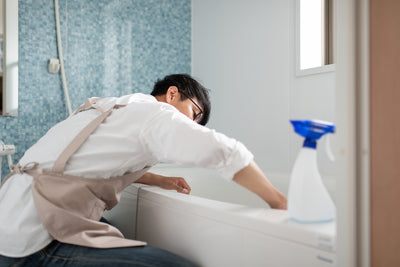What’s the Slimy Pink Stuff in My Bathroom?
RSS
Christina Liu | Water Nerd
Do you keep finding pinky slimy stuff in your shower, bathtub, tile, or sink no matter how often you clean your bathroom? The culprit is likely a type of bacteria called Serratia marcescens. Serratia marcescens can be found just about anywhere - including soil or water, and is also carried by air. These bacterial colonies feed off of mineral deposits in soap scum from shampoo and soap residue in showers and bathtubs.
Is Serratia marcescens dangerous?
Serratia marcescens is not known to cause waterborne diseases. For most healthy people, Serratia marcescens is not harmful if you brush up against the biofilm in a shower or tub. It can cause ailments such as urinary tract or bladder infections if it enters the body through the eyes or open wounds. More serious issues, including pneumonia, have occurred in people with compromised immune systems and in hospitals. Serratia marcescens is generally just an eyesore and unpleasant to touch.
How Do I Get Rid of the Slimy Pink Biofilm?
- Scrub off the biofilm using a soft bristle brush. Store-bought bathroom cleaners or a mixture of baking soda and dish soap will work. Then rinse with water. Wear gloves and protective gear to minimize exposure to bacteria.
- Disinfect the cleaned surface. Spray on a mixture of bleach and water, let it sit for at least 10 minutes, then rinse.
- Sanitize shower curtains in the washing machine (if they're machine washable). Make sure they are fully dried before hanging back up in the shower.
Can I Prevent the Biofilm From Forming?
Yes! Here’s what you can do:- Squeegee or Towel Dry hard surfaces (like in a shower or tub).
- Clean hard surfaces regularly (showers, tubs, and even the toilet bowl) regularly to minimize residue buildup.
- Machine wash shower curtains regularly to reduce bacterial growth.
- Repair leaking showerheads or faucets to maintain a dry environment.
- Keep windows in your bathroom closed when you're showering, as the bacteria is airborne and more likely to enter an open window.
- Run the exhaust fan in the bathroom to reduce the moisture in the air when you're using the bathroom.
Other Articles You Might Enjoy:
Here's Why You Shouldn't Drink Hot Water From Your Faucet
What Does The Red Dye Test Actually Measure?
5 Things You Need to Know About Bottled Water




